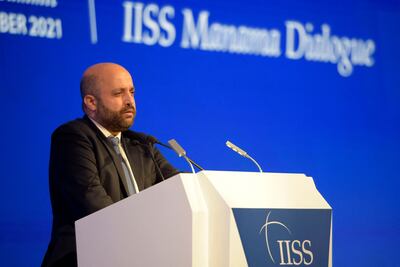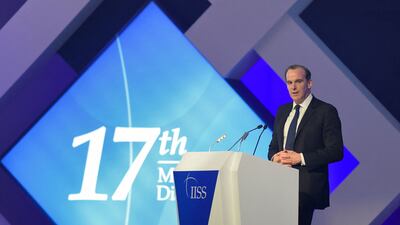The US remains committed to maintaining a presence in the Middle East to counter threats from Iran, a top US official in the region said on Sunday.
White House Middle East co-ordinator Brett McGurk told the annual Manama Dialogue in Bahrain he had been asked many times if the US was withdrawing from the Middle East.
“Let me be clear — the US is not going anywhere”, he said at the event, organised by the International Institute for Strategic Studies.
After its hasty departure from Afghanistan, and with the withdrawal of US combat troops from Iraq still scheduled to go ahead by the end of the year, President Joe Biden’s administration wants to reassure its regional allies that its interests remain aligned with theirs.
“This region is too important, too volatile — Afghanistan was about Afghanistan — it had nothing to do with our commitment here in the region,” Mr McGurk said.
‘We will never allow Iran to go nuclear’
Though the Biden government has named China as its top national security priority, the US is committed to tackling the threats posed by Iran — in particular stopping it from getting nuclear weapons.
Mr McGurk said the US will continue to use diplomacy to achieve this goal, “but we are also prepared to pursue other options should diplomacy fail”.
US Defence Secretary Lloyd Austin on Saturday said his country would prevent Iran from acquiring nuclear weapons.
Describing the regime in Tehran as “an adversary,” Mr McGurk said Washington would use diplomacy to find avenues for de-escalation wherever they exist.
“We are starting with deterrence, diplomacy, de-escalation, we are focusing on what matters, we will protect ourselves and our friends,” he said.
The US is leading the effort to resuscitate a 2015 deal that placed restrictions on Iranian nuclear activity in exchange for sanctions relief, which former president Donald Trump abandoned in 2018. The latest rounds of talks to revive the deal are set to begin on November 29 in Vienna. Discussions have been on hold since the election of Iran's new hard-line president in June.
President Ebrahim Raisi is expected to take a tough approach to negotiations.
On the issue of Iran-backed proxy forces in the region, the US was “prepared to respond decisively,” Mr McGurk said.
“We are not going to get drawn into tit-for-tat exchanges of fire with Iranian-backed proxy groups.”

Israel’s security adviser Eyal Hulata echoed the US official’s warnings, saying Iran was the “most destabilising force in the region”, “threatening civilian life” and “feeding on chaos".
Mr Hulata urged attendees of the conference in Manama to “think how much bolder and dangerous Iran will be with a nuclear umbrella, should it achieve its nuclear ambitions".
The Israeli official said it was time to “deliver a strong and unified message — we will never allow Iran to go nuclear.”
Tehran’s nuclear proliferation is a strategic threat for everyone, he said.
Israel considers Iran an existential threat, and has said that it would act with military force if needed to prevent Iran from developing nuclear weapons.
The Israeli adviser also addressed Iran’s use of proxy forces in the region.
“Iran deployed proxies on our borders, sponsored militias around the Gulf and elsewhere as agents. It engages in terrorist attacks to attack those who object to its regime,” he said.
Strengthening defences
Mr McGurk said Washington will work to shore up air defences in the region, so that its allies are better able to protect themselves from Iranian missile and drone attacks.
Saudi Arabia, he said, is already able to defeat 90 per cent of drone attacks, but the US “will not rest until it reaches 100 per cent”.
The US is prepared to share “unique US capabilities” to help the kingdom defend itself, he said, without giving further details.

Iran-backed Houthi rebels have repeatedly launched cross border attacks on Saudi Arabia using drones and missiles since the coalition intervened in Yemen at the request of the international government in March 2015.
The most recent drone attack was intercepted by the Saudi-led coalition on Friday, when air defences destroyed three drones launched towards the south and intercepted another over Yemen.
The Manama Dialogue takes place each year in Bahrain, an island kingdom off the coast of Saudi Arabia that is home to the US Navy's 5th Fleet.
More than 300 senior government officials from 40 countries, including the US, Europe, the Middle East, Africa, and Asia, will participate in the three-day security conference.


